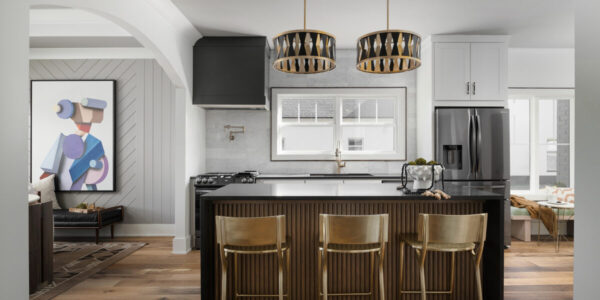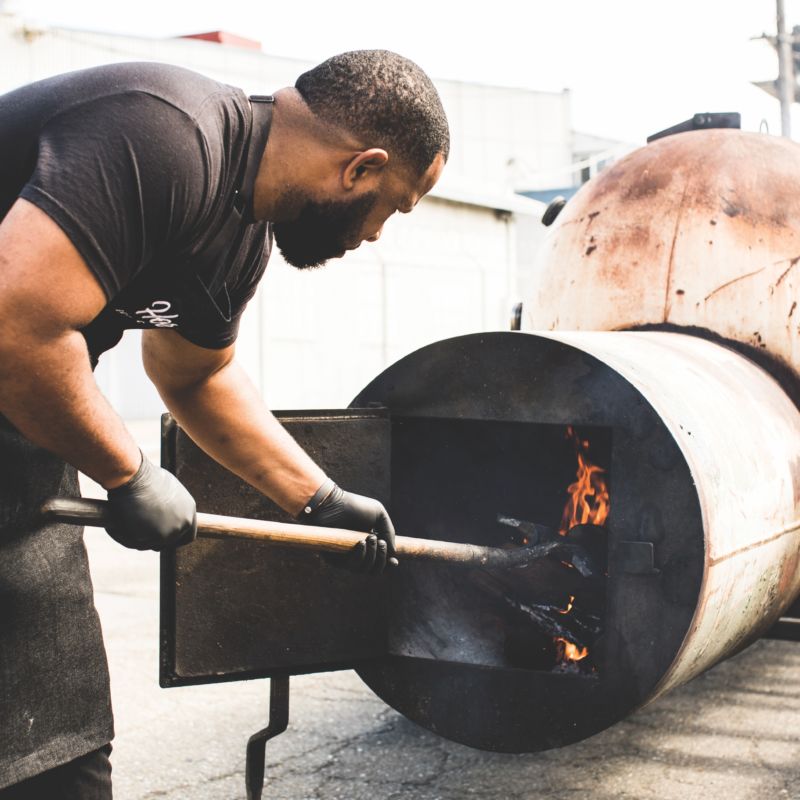
He’s the Barbecue King of California. And He Won’t Let Any Pandemic Stall His Long-Smoked Restaurant Dreams.
West Coast legend Matt Horn excels at slow and low. Here’s how he’s opening his own spot in times of crisis—and cooking by feel and faith.

Thomas J. Story
Years before Matt Horn served brisket so tender and perfectly ringed with the pink stain of oak smoke that it inspired people to happily wait in line for 45 minutes, the barbecue chef would drive three hours from Los Angeles to Fresno to hone his craft—without an instruction manual, a mentor, or even a thermometer. Horn taught himself the art of slow and low on his grandfather’s old pit, so beat up that smoke would billow out its sides, a wad of foil jammed into a hole where the thermometer used to be. It was in this cooker Horn put his hand to get a feel for the proper heat and learned to intuit temperature, time, and transformation.
“I’d be standing there with my eyes closed,” Horn remembers. “My wife would come out and ask me, ‘Are you asleep?’” To the contrary, Horn was as alert as ever.
Acutely aware of his status as a self-taught West Coast brisket maker free of the constraints of regional Texas tradition—but also free of years of received wisdom—Horn took it upon himself to intimately understand how intramuscular fat and collagen would render at what temperatures, to reckon with the legendary “stall” during which a large piece of meat seems to stop cooking altogether, dropping in temperature for hours as the laws of thermodynamics cause it to throw off heat rather than take it on.
“Even when taking notes and documenting everything, for me it’s a mind-body thing more than a data thing,” says Horn. “Those all-nighters became very therapeutic for me. It was about paying attention, relying on feel, and learning to trust the cooker.”

a toothsome bark over time.
Thomas J. Story
That trust (and those copious notes) happened to yield stupendously delicious brisket. Horn hired a man to build him a smoker that he’d cart to East Bay farmer’s markets and pop-ups and breweries where he’d sell his brisket and gain a devoted following. He eventually upgraded to a massive 500-gallon offset smoker made from two decommissioned propane tanks he found in a field in Fresno. Horn designed the smoker himself and named it Lucille after the B.B. King song that kept him company during those long overnight cooks.
“In the song he looks at Lucille as a reliable and dependable companion along with him throughout his journey,” Horn explains. “I look at what I was doing with barbecue before and after Lucille, and I honestly have to say Lucille changed my life, too.”
Today, after five years of pop-ups, awards, and glowing reviews, Horn is close to opening his very first brick-and-mortar restaurant in West Oakland—in the middle of a pandemic, with protests about Black lives and racial injustice still in full effect. Even in the best of times it’s hard enough opening a restaurant (the site was home to the first location of chef Tanya Holland’s pioneering soul food restaurant Brown Sugar Kitchen), but add a pandemic with shifting lockdowns that have decimated the hospitality industry and it’s enough to discourage any restaurateur.

Thomas J. Story
While the inevitable construction delays pushed his brick and mortar opening back, Horn did what he did from the beginning, regardless of the challenges at hand: He cooked. As quarantine took effect, jobs dried up, and grocery runs slackened, Horn smoked brisket, made sandwiches, set up tables, and fed front-line workers, the unemployed, anybody who needed a free meal—no questions asked. He set up a GoFundMe, raised thousands more than the goal, and was serving some 700 lunches a day. And so the Horn Initiative, a non-profit dedicated to food equity and social justice, was born.
“They say you can run from the storm or weather the storm,” says Horn. “When Covid hit, instead of me panicking, I decided to step up and do what I love and be a light in our community.”
The nationwide public reckoning with race and injustice also influenced how Horn saw the restaurant’s mission. “We want to be a blessing for our community when it’s hurting, and not just because of Covid. I think about the message I want to send with the food, the people we hire and train.” He’s also one of the few famous Black pitmasters in the country and asks himself what can he do to use his position to affect positive change. “I want to create a curriculum that teaches the history of the craft of Black barbecue so we can pass it along to the next generation.”

Thomas J. Story
Here we share several signature Horn recipes that are templates for how to start your own barbecue journey, even if a custom smoker and late nights contemplating the meaning of barbecue aren’t the end goal. The recipes here are a starting point for comprehension that only you can take to heart and hand. Like the series of smokers Horn learned on, every cook, every piece of beef, and every slice of pink-tinged tender brisket will be different.
Thinking back to those early days of learning, Horn admits to his restless obsession. “It wasn’t just enough for me to cook it in the backyard,” he says. “From day one I was trying to perfect it. We’ll never achieve perfection, but along the way we can find ourselves resting in excellence.”
If we’re all lucky, the doors to Matt Horn Barbecue will open soon. Covid has influenced the current layout, which holds some 50 people inside in a socially distanced dining room, and another 50 out back on the patio. The menu will have Horn’s brisket of course, but also smoked oxtail, a specialty of his grandmother. And Horn will continue to push the definition of what California, and American barbecue, can be. Until then, may you find yourself resting in excellence as you fire up whatever cooker you may have on hand and start on your own journey toward the slow and low and trusting.
The Recipes
This Came from the 2021 Waters of the West Issue—Read It Here!
Get one year of Sunset—and all kinds of bonuses—for just $24.95. Subscribe now!
